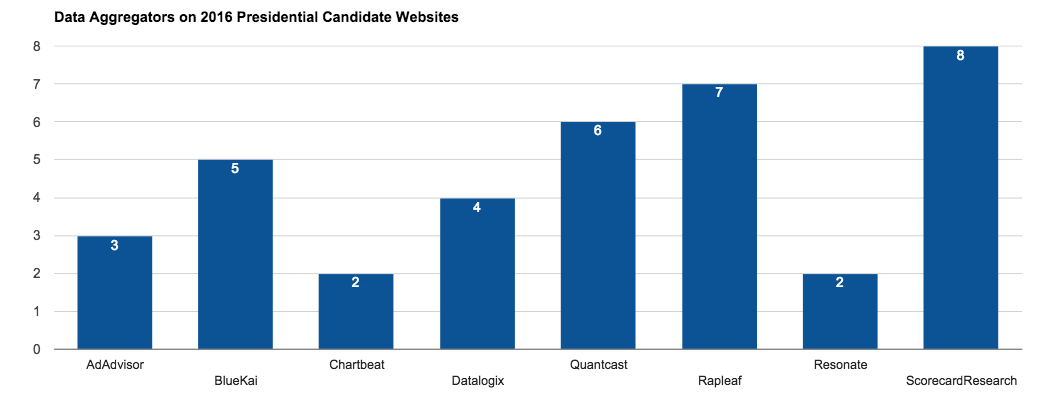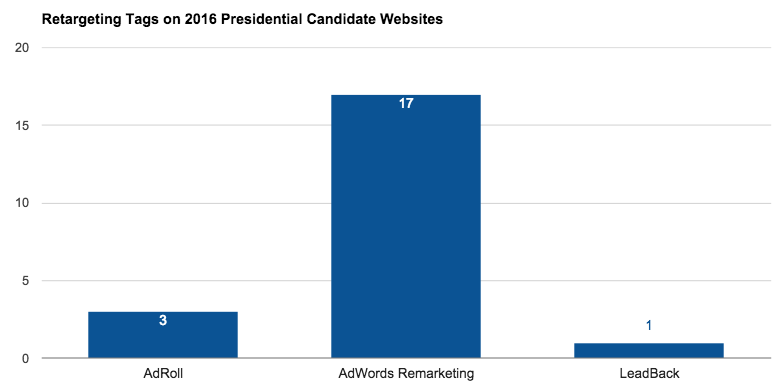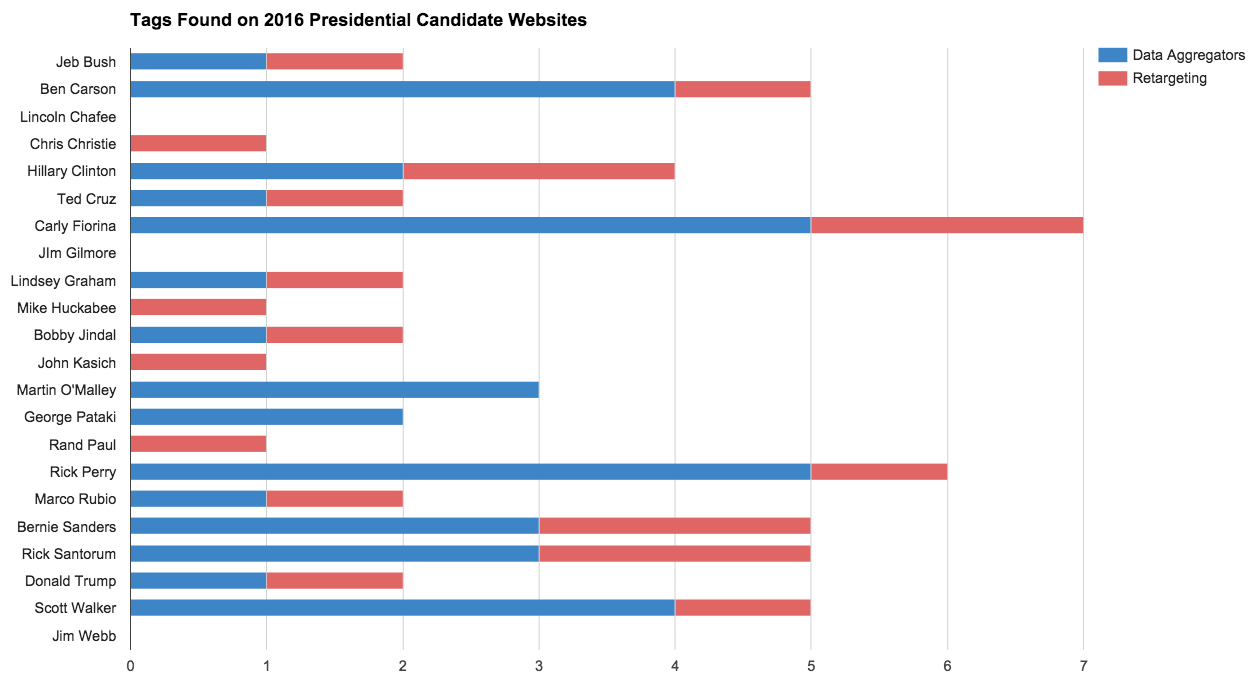As the 2016 race to the White House heats up, one issue that is white hot is privacy. Specifically, how much privacy United States citizens are entitled to from their government.
Does the government have the right to collect our information, such as phone records? Should a warrant be required to do so? What should be done with the USA Patriot Act (abolishment, reformation, or extension)? Such questions have been debated by former, current, and aspiring politicians with ferocity.
So, how do the 2016 Presidential hopefuls feel about privacy?
While many (if not all) of them have publicly voiced their opinion on the matter… we thought it would be fun to see if they are practicing what they preach, for lack of a better term.
To find out, we used Tag Inspector to scan each Democratic and Republican candidate’s website. The goal being to discover what tags, if any, candidates are using to collect your information.
When scanning a candidate’s website, two types of tags were looked for: Data aggregators and retargeting tags.
Data aggregators collect and compile information about you. This profile is often sold or shared with third parties for advertising purposes. Sometimes the information collected is personally identifying. The following data aggregators were found on candidate websites (click on a data aggregator to learn more):

This chart shows the total number of each data aggregator found on 2016 presidential candidate websites.
Retargeting tags are used by the website you’re on to serve you ads related to that site based on your behavior. For example, have you ever added a product to your cart, left without purchasing, and then seen an ad for that product everywhere? If you answered “yes”, then you’ve been retargeted. While some people have described retargeting as creepy, it does not collect or use personally identifying information. The following retargeting tags were found on candidate websites (click on a retargeting tag to learn more):

This chart shows the total number of each retargeting tag found on 2016 presidential candidate websites.
The main difference between data aggregators and retargeting tags is that data aggregators are collecting information about you, storing that information (building a profile), and then using, sharing, or selling that “profile” so that a slew of companies, candidates, etc. can serve ads to you. Retargeting, on the other hand, is not building a profile on you and is limited to the products and services of the site you’re currently on (you’ll only see ads related to that site).
To Summarize: Are the 2016 Presidential Candidates Collecting Info About You? Yes.
Some are collecting information to retarget to you. Others are allowing aggregators to use their site to collect information about you. The chart below shows how many of the two different tag types are on each candidate’s website.

This chart shows how many of each type of tag (data aggregators and retargeting tags) were found on each candidate’s website.
Only 3 of the candidates have 0 data aggregators and retargeting tags on their site:
- Lincoln Chafee
- Jim Gilmore
- Jim Webb
7 of the candidates are using “Rapleaf,” a data aggregator which does collect personally identifying information about people (name and email address) and has been in trouble in the past for selling that information to third parties. The candidates using Rapleaf are:
- Ben Carson
- Hillary Clinton
- Carly Fiorina
- Rick Perry
- Bernie Sanders
- Rick Santorum
- Scott Walker
Here’s a detailed look at each candidate’s website.
To see what the candidates have said in regards to the Patriot Act and privacy, read Where do the 2016 candidates stand on the Patriot Act and mass surveillance.
– – – – –
About the Tags Found
Data Aggregators:
AdAdvisor
According to their site, AdAdvisor “Provides demographics-based data to online marketers and websites to help them improve their ability to deliver more relevant and interesting content and advertising to consumers.”
AdAdvisor says that their process works using a cookie that: “is associated with your Web browser that enables companies to recognize your computer – to store data and deliver it to our partners.”
Sources: AdAdvisor
BlueKai
BlueKai is a data aggregator, and it is one of the largest aggregators of consumer behavior in the country.
When you visit a website in their network, they install a tracker on your computer that basically looks over your shoulder and tracks your activity (ex. what websites you visit). It assigns this behavior to you using a unique ID number. BlueKai then packages and shares or sells this data to other companies that basically profile you using over 30,000 different segments (ex. estimated household income). Then, when you visit websites that recognize your unique ID you see ads that are targeted to your profile.
Sources: The Online Privacy Blog
Chartbeat
Chartbeat works a little differently than other data aggregators. It collects real-time information on how users are interacting with content. For example, you’ll often find Chartbeat on news sites so that the company can see how many individuals are on a specific article at any given time.
Sources: ChartBeat
Datalogix
According to CrunchBase, “Datalogix® is the industry-recognized leader at connecting digital media and offline purchasing data. DLX ROI® is rapidly becoming the industry standard for measuring offline sales lift for digital media. Datalogix also offers predictive analytics for Direct Mail, and integrated media solutions via the DLX Net.”
Datalogix connects offline behavior with online behavior in a variety of ways. For example, when you go shopping and provide your ZIP code or email address at checkout, you are helping them to pair you up with online behavior. They also get information by partnering with other companies and through public records.
Sources: CrunchBase, Quora
Quantcast
Quantcast is a data aggregator that collects anonymous information such as when a browser loads its web beacon (cookie). They do not collect any personally identifiable information. However, Quantcast may share data with 3rd parties including “companies employed to support Quantcast”.
Sources: The Guardian
Rapleaf
Rapleaf is a data aggregator that compiles a vast range of information including political leanings, religious affiliations, and personally identifiable information (PII) such as your name and email address.
Rapleaf claims that it does not distribute personally identifiable information; however, in 2010, the Wall Street Journal discovered that in some cases the data aggregator had shared PII. Specifically, they state the case of Mrs. Twombly who had her unique Facebook ID number shared with at least 12 separate companies.
According to the Wall Street Journal, segments sold by Rapleaf to other companies include:
- Household income range
- Age range
- Political leaning
- Gender
- Age of children
- Interests
According to The Online Privacy Blog, Rapleaf got in hot water in the past for selling personal information to the Maine GOP for retargeting around the election. In addition, Rapleaf was kicked off of Facebook at one point for selling unique Facebook IDs to advertisers.
Sources: Wall Street Journal, The Online Privacy Blog
Resonate
Resonate collects data at two different levels: 1.) anonymous “browser-level” and 2.) through online interviews.
Resonate’s privacy policy states that the company does not collect personally identifying information in relation to the delivery of advertisements. However, their privacy policy also states that information may be shared with unaffiliated third parties.
Data collected by Resonate may be saved for a period of 10 years.
Sources: Resonate
ScorecardResearch
Scorecard Research provides market research data through online surveys and the use of cookies. The information collected is either voluntarily given (through surveys) or anonymous “browser-level” behavior such as how often a specific site is visited.
Source: The Guardian
Retargeting Tags:
AdRoll
AdRoll compiles a list of individuals that have visited your site using a Javascript tag placed on the website. This list is then used to serve ads to the user as they visit other sites.
AdRoll’s website states “Since AdRoll works with the largest ad exchanges, we can retarget your customers just about anywhere they might go online.”
Sources: AdRoll
AdWords Remarketing
A Google product, AdWords Remarketing allows you to serve ads to individuals who have visited your website or mobile app in the past. You can tailor these ads based on behavior such as certain products or services viewed or pages viewed. Again, the most common use case of this is serving ads to someone that added something to their cart but did not checkout.
Sources: Google
LeadBack
Like Adwords, LeadBack allows you to serve ads to individuals that have visited your site. These ads are displayed across various websites in their network.
Sources: CrunchBase
Shameless Self Promotion for Tag Inspector
Tag Inspector is a tag auditing and alerting tool developed by InfoTrust engineers. Its intended purpose is to help clients monitor and troubleshoot the tags running on a website. For example, a client may use Tag Inspector to ensure Google Analytics is firing on all pages.
To find out more about Tag Inspector, including how it can benefit your site, visit: https://taginspector.com/.